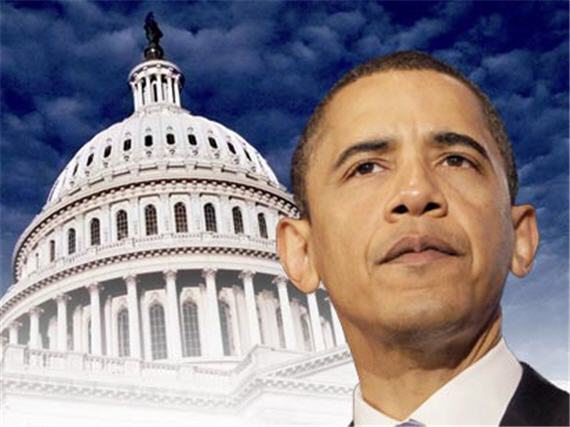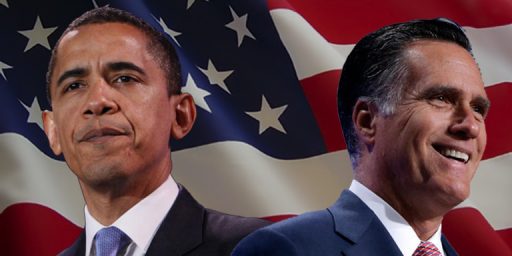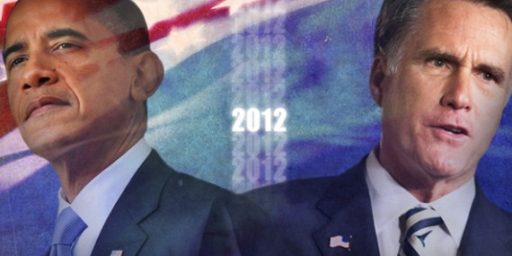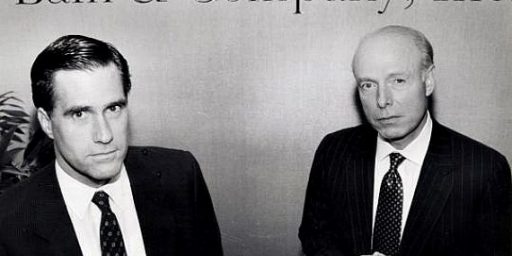Obama To Make Same Promise About Tax Cuts He Did In 2008
Get ready for the battle over the Bush Tax Cuts to start up yet again.
When President Obama ran for President in 2008, one of the central parts of the fiscal plan he put forward included a call for the so-called Bush Tax Cuts for people making more than $250,000 a year to be ended when they were set to expire at the end of 2010. As we know, of course, Obama ended up ignoring that call on his own when he made an end run around his own Democratic caucus on Capitol Hill to make a deal with Republicans to extend all the tax cuts for two more years. With that deadline now fast approaching, and with many analysts warning about the “fiscal cliff” that the economy will face in early 2013 if the tax cuts are allowed to expire, some of Obama’s fellow Democrats, including former President Clinton, are suggesting that the party should agree to a temporary extension of all the cuts to allow time for a broader deal to be made and so as not to shock the economy with huge tax increases. President Obama, however, has apparently decided that his own opening move in this dance that will likely last until December will be a repeat of the promise he made in 2008:
WASHINGTON — With a torpid job market and a fragile economy threatening his re-election chances, President Obama is changing the subject to tax fairness, calling for a one-year extension of the Bush-era tax cuts for people making less than $250,000.
Mr. Obama plans to make his announcement at the White House on Monday, senior administration officials said. The ceremony comes as Congress returns from its Independence Day recess, and as both parties and their presidential candidates head into the rest of the summer trying to seize the upper hand in a campaign that has been closely matched and stubbornly static.
House Republicans plan to vote this month to extend for a year all of the Bush tax cuts, for middle- and upper-income people.
The president’s proposal could also put him at odds with Democratic leaders like Representative Nancy Pelosi of California and Senator Charles E. Schumer of New York, who have advocated extending the cuts for everyone who earns up to $1 million. And it will most likely do little to break the deadlock in Washington over how to deal with fiscal deficits, an impasse that has only hardened as Republicans sense a chance to make gains in Congress this fall.
But by calling for an extension for just a year, Mr. Obama hopes to make Republicans look obstructionist and unreasonable. Trying to bounce back from another weak jobs report on Friday, he also hopes to deepen the contrast with his challenger, Mitt Romney. On Friday, the president said Mr. Romney would “give $5 trillion of new tax cuts on top of the Bush tax cuts, most of them going to the wealthiest Americans.”
(…)
The struggle to frame the tax debate comes as the campaign moves into a period, only four months before the election, when the perceptions of voters begin to harden. Polls show a persistently tight race, with Mr. Romney closing in on Mr. Obama in certain swing states but with neither candidate able to break out decisively. Control of Congress is also up for grabs, with Mr. McConnell saying on Sunday that he believed the Republicans had a 50-50 chance to regain control of the Senate.
To find a compromise with Republicans on which Bush tax cuts to extend, Ms. Pelosi, the House minority leader, and Mr. Schumer, a member of the Senate Finance Committee, favor making $1 million the cutoff. Above that level, Mr. Schumer has said, people are not likely to spend the savings from lower taxes and help the economy.
Administration officials said they did not believe that the difference between the White House and these Democratic leaders was a big obstacle. They said that whether to use $250,000 or $1 million as a cutoff was more a matter of strategy than a “religious debate,” in the words of one official, who added that many other Democrats favored $250,000.
(…)
White House officials insisted that Monday’s move was more than politics. They said it would ease anxiety over the “fiscal cliff” — the combination of tax increases and automatic spending cuts that are scheduled to kick in at the end of this year. That one-two punch, economists say, could deal a heavy blow to an already tender economy unless the White House and Congress work out some kind of compromise.
Proposing a one-year extension, a senior official said, recognizes that Mr. Obama and the Republicans are not likely to resolve the larger debate over whether to extend the Bush tax cuts for everyone or, as Mr. Obama has long advocated, just for the middle class. That debate is likely to be decided at the ballot box, where a victory by Mr. Romney would almost certainly enshrine all the tax cuts.
“To the degree that there is concern about the economy, we’re saying, ‘Let’s extend the middle class tax cuts for a year,’ ” said Gene B. Sperling, director of the White House’s National Economic Council. “Economically, extending tax cuts to those workers will have the most effect on them and the strongest impact on the economy.”
Politically, it’s not surprising that the President is making this move. He’s been hitting the “tax fairness” argument since last September when he starting pushing the so-called Buffett Rule, a measure which has pretty much disappeared from the campaign’s agenda interestingly enough. Additionally, as was the case when we had this debate after the the 2010 elections, the public is generally supportive of the idea of not extending the Bush Tax Cuts for “the rich,” although there as been something of an interesting debate going on inside the Democratic Party over where to draw that line. As noted above, Nancy Pelsoi and Chuck Schumer, among others have pushed for a $1 million threshold on the tax increases, arguing with some justification that in the states they represent $250,000 per year is pretty close to being a middle-class income for an average family. Additionally, Democrats in the Senate haven’t been all that enthusiastic about pushing the Buffett Rule. Nonetheless, one can certainly argue that there are good political reason for staking out as an opening position in the tax cut debate a position that is widely supported by the public.
Of course, the fact that what the President is proposing is widely supported doesn’t mean that it will become law. We had the same position in 2010, and it was the President, not the Republicans, who ended up blinking in what, in the end, wasn’t really much of a showdown. There’s no reason that won’t happen all over again, and every reason to think that it probably will. In the end, just as in 2010, the President clearly does not want all of the tax cuts to expire. The Republicans know this, and as long as they maintain a united front it isn’t difficult at all to see the President backing down once again.
The White House appears to be pining much of it hope on the idea that the election will decide this issue, but I’m not sure that’s the case. Clearly, if Mitt Romney wins, the tax cuts will be extended, most likely for the duration of Romney’s first term if not longer. However, a victory by Obama doesn’t necessarily mean that he’ll get his way on the tax cuts. Republicans are still likely to hold on to the House of Representatives and, even in the case of an Obama victory, could eke out a small majority in the Senate. Obama will still have to deal with them, and the dynamics I noted above will still be in place, as will the desire of all concerned to do nothing that could possible result in the economy being tossed into recession in 2013.
So, this is an interesting political strategy on the Administration’s part, and I’m sure they’ll get plenty of support for it from the usual suspects, but I’m not sure it’s a fight they can win in the end.







I don’t know why anyone would want a President who “promises” to ignore changing conditions and new realities for the next 4 years.
If a political “promise” just means “this is my starting point, and you’re going to have to work hard to convince me otherwise,” that’s fine.
Anything else is … anti-intellectual, irrational, unreasonable.
(For extra credit you could name the party engineer who has made anti-intellectual, irrational, unreasonable promises his primary tool.)
Doug
Please don’t say Obama simply ignored the Bush tax cuts before 2010 without putting it in context. Without the context you make it appear as though Obama intentionally lied or no longer supported his campaign stance on the Bush tax cuts – which is disingenuous.
Among other things, at the time of the debate Obama never got the support from some key democrats affraid of the republican onslaught that was pending in the 2010 elections. Republicans dictated the argument back then by saying the expiration of the tax cuts would increase everyone’s taxes (not true) and Obama did something republicans have not done since Obama took office – compromise, by kicking it down the road by two years.
Lets not catch political amnesia now.
Maybe I missed it…but I don’t think you mentioned that Obama leveraged the tax cut extension for added stimulus. I would applaud similar leveraging now. Only children (and Republicans) believe its all or nothing.
I always get a kick out of these dog and pony shows by Obama. For the obvious reasons, of course.
Also because I’ve always found amazing the Democrats’ obsession with arbitrary and capricious income lines.
Why draw this particular line at $250,000? It’s a self-perpetuating conundrum of ironies.
Don’t they realize that by negative implication they’re admitting that people earning up to $250,000 per annum nevertheless still are part of the middle class? Don’t they realize how small of a percentage of the American public earns more than a quarter of a million dollars per year? Don’t they realize the differences in real purchasing power between someone earning $245,000 per year and someone earning $255,000 per year are less than negligble, especially for those with kids? Shit, probably the greatest irony is the airheaded left would not be able even to grasp those ironies.
Given the weakness of the recovery, letting the whole package lapse seems to be off the table. At some point, I think the correct policy choice (barring a more comprehensive reform) is to let the whole shebang go. That, in combination with some cuts, will do a lot for the gummint’s balance sheet. Trouble is nobody wants to do it, especially with the economy still so weak.
Tsar is basically right about the $250k cutoff (that calling a $240k/yr household “middle class” is fundamentally absurd), but this particular dog & pony show tends to do a good job of getting the GOP to flounder about trying to explain why the over-$250k set can’t accept a fairly minor tax increase.
Also agreeing with Tsar on the 250k. Another aspect of the tax cut tussle is that leaving the cutoff at 250K still means a sizeable tax cut for the first $250K of earnings even for those bringing in more than 250K. In a more rational world that threshold would mark the point where the under-250k tax rate would be clawed back.
It really doesn’t help when former Democratic donors simply run away …
What do they know that we don’t ? .. or is it simply dollars and cents ?
I guess she needed time to practice her Austrian.
@Tsar Nicholas: Well, the line has to be drawn somewhere. It’s going to be arbitrary because that’s the only way it can be. There’s no way to fuzzy-up the line between $249,999.99 and $250,000.00.
The real key is in what goes into figuring out where to draw that line. In this case it seems the line wasn’t drawn based on anything but what the administration pulled out of its collective backside. Why $250K rather than $150K or $500K or a million? What’s magical about $250K? Why are they pretending $250K in New York City is the same as $250K in Kansas City?
There’s certainly plenty of room for long-overdue tax reform, but what the administration’s doing here is just transparent pandering.
This is my greatest worry regarding our economy, that the election will result in entrenched commitment toward “deficit reduction”. Failure to extend current tax rates and spending levels is the equivalent of economic suicide when the non-government sector is still exceedingly weak. With all due respect to the President, tax fairness will accomplish nothing (although as a social goal I fully support a fairer distribution of the tax burden) but feed calls for contractionary fiscal policies and further erosion of employment.
If the President is truly concerned about economic performance then he should be campaigning on a large increase in budget deficits to improve the private sector’s financial wealth and ability to spend. So far we’ve heard little more than nonsense from the White House about getting our “fiscal house in order”.
@Tsar Nicholas:
Ahhh, the “airheaded” attach comming from the airheaded righties that think they are somehow smarter becuase those from the left does not agree with their airheaded perspective!
Allow me to ask you a question. Do you realize that the tax code is tiered? In other words, it doesn’t matter that the purchasing power of one family making $245,000 isn’t much different than that of a family making $255,000. The family making $255,000 gets the same percentage of taxes taken out up to $250,000 leaving the remaining $5000 to be taxed at the higher rate. In affect, the purchase power of the two families after the tax increase is negligible while those that make substantially more are more than likely well-off and can afford the higher tax bracket anyway.
Yes, this only affect 1% but this was never intended to be a solution to a deficit problem (which is the first dumb argument republicans try to make). It was always a matter of shared sacrifice and we all agree that there should be some shared sacrifice. Yet republicans wants to extend a tax cut that disproportionately favors the wealthiest among us while calling for cuts that disproportionately affects the middle class and poor.
I can’t think of a legitimate reason that wealthy people should pay a higher tax rate then the rest of us. They already pay more taxes. 30% of $3 million is a lot more then 30% of $40,000 – my salary. But that is neither here nor there. What really bugs me is the governments (Federal, state, local) try to “social” engineer behavior with these so called “sin” taxes, which come straight out of the communist play book! One example is the proposed tax on tanning beds. I am certainly against these things, but that is not for the government to try and control people’s behavior (communistic style tactic) through taxes. It also will hurt the small businesses that have these. No one makes anyone use them. A better strategy would be to use education and advertising: people will listen to that, or some sort prizes if you stop using them and other things that may be unhealthy They did not have these sort of taxes when I was a child.
There are many other examples of these so-called “sin” taxes. Most of the time they backfire and actually increase usage. The last thing we need in this country is more communist programs.
@Clanton: Are you high?
I rarely vote helpful or unhelpful…
But I just gave Ben Wolf an up vote.
Judging by the protestations over the Tanning Tax…Clanton may actually be John Boehner.
Watch and see if he cries…
@Clanton:
Well, yeah, they did. “Luxury” taxes (or call them what you will) have been around in varying permutations for a long time. In addition, the Code has long operated in a way to favor certain types of “behavior” (home ownership, for example) over others. The only difference between what you and others like you claim to be something that only Obama has proposed and reality is, face it, the color of his skin. That wasn’t so hard now, was it?
Not that I don’t agree with that fiscal policy, but, I’m curious, which Republican would vote for that? And which Republican wouldn’t demagogue him for proposing that?
@Ben Wolf: Uh, it might just be this convenience store coffee!
@An Interested Party:
(a) None.
(b) None.
This has been another installment of “Simple Answers to Simple Questions” (and seriously, what Republican would vote for ANY piece of legislation that he favors?).
Well of course that’s the whole point…the President could propose any number of helpful solutions to the problem and they will go nowhere as the GOP opposes just about anything he wants to do…
I suggest reading up on the concept of marginal utility. That’s one reason.
Another reason is simply that the money has to come from someone, and typically that means taxing people who can actually pay, as opposed to people who can barely make ends meet as it is. You can’t get blood from a stone and all that.
A third reason is that without some checks on the runaway consolidation of wealth (progressive income tax, estate tax), what you will get is a formation of an aristocracy. The deal used to be that we had more inequality in the USA, but greater “social mobility.” Report after report shows that this is no longer the case. Inequality up, social mobility down. That does not lead to a good place.
First off, sin taxes pre-date Communism. So no, they’re not “right out of the communism playbook.”
Second, sometimes they’re a bad idea, and they can be taken too far. They are often regressive, which is one reason to be skeptical of them. On the other hand, if a particular behavior is clearly harmful but you don’t want to take the more draconian step of banning it, taxing it is a way to curtail it, while raising some revenue.
Social engineering via the tax code isn’t communist. It may or may not be a good idea (I’d go case by case with it), but the commies aren’t coming because some state raised its cigarette tax.
@Tsar Nicholas: We also have to look at the cost of living, in places like NYC and other high cost areas..where that $250,000 does not go as far. Some Democrats actually wanted it to affect the $1million dollar earners and up, not the $250,000 minimum. ..but they didn’t win out.